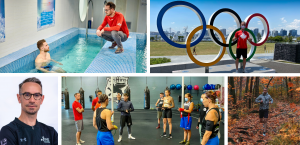François Bieuzen

Photo credits: Photo courtesy of François Bieuzen / INS Québec
* Second bottom photo: Pre-Olympics Training Camp in North Vancouver
Professional background
Profession: Exercise Physiologist
Olympic Games: Tokyo 2020
Tokyo 2020 Sport: Boxing
Q. Was there a specific time in your life when you said to yourself that you wanted to work with high performance athletes or who would be going to the Olympics?
A. “Like many people, I was marked by my first Olympic Games, which we experienced as a family while watching television. I never missed this sporting event during the summer holidays. The Barcelona 1992 Summer Olympics made a big impression on me with the men’s long jump event with Lewis and Powell. This epic clash between these two athletes convinced me that more could be done, better and that nothing was ever finished until the last jump or the last second. Then, like many children, I dreamed of being an Olympian, but I soon realized that the step was a bit high for me, but that didn’t stop me to continud to train seriously. Then around fourteen years old, I started to take an interest in the Institut national du sport, de l’expertise et de la performance (INSEP), where I lived in France. My father then arranged for us to go visit the place one day, meet with staff, chat with athletes, and little by little, that confirmed my interest. So I knew at that moment that I wanted to work with these athletes, in these organisations and for big events like the Olympics. Since then, my focus has always been towards this objective.”
Q. How do you encourage your athletes every day to keep training?
A. “Today is a real collaboration between the members of our staff, the athletes and the coaches. We support them at all times to allow them to always glean a little more precious seconds, points or centimeters. We help them stay healthy and balance rest and training. More concretely, I adjust the recovery techniques or the training load individually according to the measures available. We are constantly looking for new training techniques so that we can continue to be the best.”
Q. How do you see your experience at the Olympic Games?
A. “Certainly very special this year, because the health context imposes many restrictions. Despite that, I think this is going to be the biggest sporting event of the year, that the performances are going to be very high and that we will come out with a magnificent experience. I also expect that we will have surprises with the results and maybe even more intense confrontations, because the athletes have had very little opportunity to compete in the last two years so they will give everything they have to reach their goals.”
Q. What is your role at the Games and with which sport?
A. “I am assigned exclusively to the boxing team. My role is manifold. As the Exercice Physiologist of the team, I work very closely in collaboration with Daniel Trépanier, the head coach, and I ensure the proper management of the training load, recovery and sleep of the athletes. I also have the role of the leader of the integrated support team. I also organise the logistics with our staff from Montreal so they can provide remotely follow-ups with the athletes such as video or nutrition for example.”
Q. What activities (other than sports) do you like to do to take your mind off things?
A. “I particularly like baking and taking pictures. These are two activities which mobilize both technique and creativity and require concentration for a long time.”
Q. Could you share something important for you with us?
A. “One important thing that I have learned is that any living system needs to rest to continue to adapt and improve and this balance is very fine and difficult to achieve. “Always more” is not always very effective. On the contrary, “always better” is the key. Both physiological and mental rest are extremely important parts of a successful training plan.”
Q. What excites you most about your job?
A. “Learn, be curious, innovate. The fact that every day is different from the last and that you have to constantly question yourself to continue to be the best.”
Q. Is there a particular quote that inspires you?
A. “Two quotes have strongly animated me since the beginning of my career : “Humility for oneself, ambition for others.”, by Claude Fauquet, a great man of French swimming, and “Happiness is a childhood dream come true in adulthood.”, by a famous neurologist, and which reflects exactly what I am experiencing at the moment.”